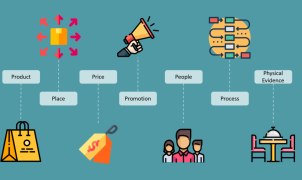In the fast-paced digital landscape, businesses are increasingly relying on effective digital marketing strategies to drive growth, expand their reach, and achieve their goals. This essay explores a variety of digital marketing strategies that businesses can adopt to propel their growth in the competitive online realm.

1. The Digital Transformation of Marketing: The advent of the internet and technology has revolutionized the way businesses connect with their audiences. Digital marketing has emerged as a dynamic and powerful tool that offers unparalleled opportunities for growth and engagement. With the right strategies, businesses can tap into a global market and build strong brand presence.
1.2 Harnessing the Power of Social Media: Social media platforms have become hubs of connectivity, making them essential for business growth. Effective social media marketing involves creating engaging content, building a community, and fostering meaningful interactions with followers. The strategy extends beyond mere advertising to genuine engagement that nurtures brand loyalty and drives conversions.
2.1 Search Engine Optimization (SEO) Mastery: A robust online presence starts with a strong foundation in SEO. By optimizing their websites for search engines, businesses can increase their visibility in search results and attract organic traffic. Incorporating relevant keywords, optimizing meta tags, and creating high-quality content are key aspects of a successful SEO strategy that ultimately drives growth.
2.2 The Power of Content Marketing: Content marketing remains a cornerstone of digital growth strategies. By creating valuable and relevant content, businesses establish themselves as industry experts and provide solutions to their target audience’s problems. Blogs, articles, videos, and infographics contribute to building trust, enhancing SEO, and driving traffic to websites.
3.1 Pay-Per-Click (PPC) Advertising Mastery: PPC advertising offers a direct and measurable approach to driving growth. By strategically placing ads on search engines and social media platforms, businesses can target specific demographics, increase brand visibility, and drive traffic to their websites. The key is meticulous keyword research and ad optimization to ensure a high return on investment (ROI).
3.2 Email Marketing: Building Lasting Connections: Email marketing is a time-tested strategy that continues to yield impressive results. Businesses can build and nurture their customer base through personalized email campaigns. By providing valuable content, offers, and updates, companies can cultivate customer loyalty, increase repeat business, and drive growth.
4.1 Influencer Marketing: Leveraging Authority: Influencer marketing involves collaborating with individuals who have a significant following and authority in a particular niche. This strategy allows businesses to tap into the influencer’s audience, gaining credibility and expanding their reach. Effective partnerships can boost brand awareness and credibility, driving growth through increased exposure.
4.2 Data-Driven Decision Making: Digital marketing strategies are most effective when they are guided by data. Analyzing metrics such as website traffic, conversion rates, and engagement levels helps businesses understand what works and what needs improvement. Data-driven insights enable adjustments and refinements that lead to more effective growth strategies.
5.1 Conclusion: The Road to Digital Growth Digital marketing strategies are no longer optional; they are imperative for businesses aiming to thrive in today’s digital age. By embracing social media, SEO, content marketing, PPC advertising, email campaigns, and data-driven insights, businesses can chart a clear path to growth. The digital realm offers endless possibilities, and with the right strategies, businesses can harness its power to achieve unprecedented success.

Crafting Effective Digital Marketing Strategies for Business Growth
In the ever-evolving landscape of digital marketing, crafting strategies that drive business growth requires a thoughtful blend of innovation, adaptation, and optimization. This essay delves into the intricacies of creating effective digital marketing strategies that propel businesses toward sustained growth and success.
1.1 Defining Digital Marketing Strategies for Growth: Digital marketing strategies for growth encompass a range of tactics aimed at expanding a business’s reach, increasing brand visibility, attracting new customers, and fostering loyalty. These strategies leverage the digital channels available to connect with audiences in meaningful ways that ultimately drive revenue and success.
1.2 Understanding Target Audiences and Their Needs: A successful digital marketing strategy starts with a deep understanding of the target audience. By conducting thorough market research, businesses can identify their audience’s preferences, pain points, and behaviors. This insight allows for the creation of tailored content and campaigns that resonate and engage.
2.1 Creating Compelling Content: Content lies at the heart of digital marketing strategies. From blog posts to videos, businesses must create content that educates, entertains, and resonates with their audience. High-quality content not only establishes a brand’s authority but also encourages sharing, driving organic growth through word-of-mouth and social media.
2.2 The Role of Search Engine Optimization (SEO): SEO plays a pivotal role in increasing a business’s online visibility. Effective SEO involves optimizing websites for search engines, ensuring they rank high in search results. By targeting relevant keywords, optimizing on-page elements, and building quality backlinks, businesses can attract organic traffic and fuel growth.
3.1 Social Media Engagement and Interaction: Social media platforms provide a unique avenue for businesses to connect with their audience in real-time. By cultivating an active social media presence, responding to comments, and fostering engagement, businesses can build a loyal community, amplify their brand, and drive growth through viral content and word-of-mouth.
3.2 Paid Advertising for Targeted Reach: Paid advertising, such as Pay-Per-Click (PPC) campaigns, enables businesses to reach highly targeted audiences. By crafting compelling ad copy, selecting relevant keywords, and setting precise demographics, businesses can ensure their ads are shown to those most likely to convert, optimizing their return on investment.
4.1 Email Marketing: Building Relationships: Email marketing remains a potent strategy for nurturing leads and maintaining customer relationships. Crafting personalized, value-driven email campaigns keeps customers engaged, informed, and interested in a business’s offerings. By building trust over time, businesses can convert subscribers into loyal customers and drive growth.
4.2 Analyzing Data for Continuous Improvement: Data analytics are indispensable in refining digital marketing strategies. By monitoring key metrics, such as click-through rates, conversion rates, and engagement levels, businesses can identify what works and what needs adjustment. Data-driven insights enable the optimization of campaigns for maximum impact.
5.1 Adaptation and Agility: The Key to Success: Digital marketing is fluid, with trends and algorithms constantly evolving. Successful strategies require adaptation and agility. Businesses must stay informed about industry shifts, technological advancements, and changing consumer behaviors, adjusting their strategies to remain relevant and effective.
5.2 Conclusion: Forging the Path to Growth Crafting effective digital marketing strategies is both an art and a science. Businesses that invest in understanding their audience, creating compelling content, leveraging SEO and paid advertising, nurturing customer relationships, and embracing data-driven optimization position themselves for sustained growth in the digital realm. In an era where digital connectivity is paramount, the strategies outlined here pave the way for businesses to thrive and prosper.





















































































































































